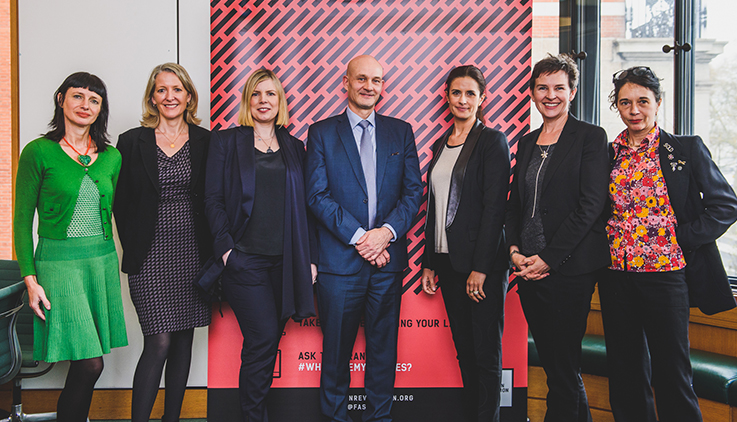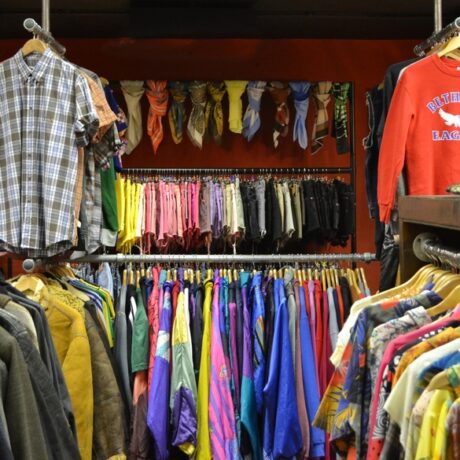Fashion Question Time at the House of Commons
The 2nd Fashion Question Time event organised by Fashion Revolution and Mary Creagh MP in the House of Commons yesterday was a huge success. The event brought together leading figures across government and the fashion industry to discuss the steps needed to create revolutionary change. The overarching theme was the urgent need for transparency across the sector in order to drive improvements for garment workers.
Attendees included high level fashion industry representatives from across the sector, global brands, retailers, press, MPs, influencers and NGOs. Panellists include Livia Firth, Eco Age Creative Director; Antti Karhunen, Head of Unit for the European Commission’s Directorate-General for International Cooperation and Development; Jenny Holdcroft, Policy Director IndustriALL; Mike Kane, MP, Shadow Minister for International Development and Allanna McAspurn former CEO of MADE-BY. The event was chaired by Mary Creagh MP.
Desmond Swayne MP, Minister for International Development, gave an opening speech:
40,000 people a day are abandoning their homes in pursuit of a better future for themselves and their families. We need 60 million more jobs over the next decade to avoid a generation of young people who are angry and despairing. It’s all about jobs, but not just any job: not if it is poisoning your community, or costing your life. We need jobs that add value to communities, not detract from it.
A selection of the questions and answers over the 1 ½ hour debate are below.
How have you seen global fashion supply chains changing in the part three years since the Rana disaster? asked Ieva Vilimaviciute, Marketing Communications Coordinator Sedex Global.
Jenny Holdcroft heads the Accord Steering Committee and responded by saying that it has taken way longer than expected. The level of awareness about what needs to be done has been raised, but we aren’t seeing the change. There has been a lot of effort in the past on individual fashion brands and retailers to change their practises, but awareness is building that it is not in the capacity of a single company to change its ways as it has to remain competitive. The simple answer is that change has to be industry-wide.
Marilyn Croser, Director of CORE, asked: Under the Modern Slavery Act, companies with an annual turnover of more than £36million are required to report on what they’re doing to make sure slavery and trafficking are not taking place in their supply chains. A recent analysis by the Business and Human Rights Resource Centre of the first 75 statements revealed a lacklustre response from business. Should government be doing more to enforce supply chain standards, such as making purchasing companies liable if abuses are found?
Fiona McTaggart MP, who was in the audiences, said that it has only been a legal responsibility of companies to publish for 18 days. The most important aspect of the legislation for this audience is that we need to use our knowledge to put pressure on companies. We need a central place where the statements from companies are lodged so that you can companies’ responses and compare across sectors.
Anna McMullen, Policy Director at Labour Behind the Label, asked: I was recently in a meeting with representatives from the Italian shoe industry who were calling for more transparency for products in their industry, and legislation to deliver this. Given that some industry representatives are calling for action, and there is a clear need for it from a human rights perspective, will the EU and the UK government use the opportunity of the non-financial reporting directive to encourage companies to disclose their supply chain locations and data?
Antti Karhunen said that this directive applies to large companies with more than 500 workers. Companies should publish their disclosure on risks and results, environmental, social, HR issues, but there is a lot of flexibility as to how companies provide this information.
Mike Kane commented that it is great to legislative mechanisms, but it would be better if the industry tried to change itself. He also highlighted the need to make buying ethically cheaper for everyone.
Allanna McAspurn highlighted the fact that brands were worried about disclosing their dye houses for Greenpeace Detox as the felt that, if they were made public, it would leave them open to scrutiny from NGOs. However, the brands who have done this have only seen a positive effect.
Livia Firth said that the revenue of Walmart is greater than that of 86 countries in the world. The owners of H&M and Inditex have enormous power to change the world. She disagreed with the myth that fast fashion is democratif. If clothes were not disposable, we wouldn’t be here talking about the issue of slavery.
Jenny Holdcroft thought that legislation was the way forward as if brands HAVE to do it, they will be less reluctant as everyone else will be doing it as well. She said that transparency should be the norm, but it is extraordinarily difficult to get companies to disclose their supply chains.
Dorothy Maxwell, Head of Sustainability, House of Fraser asked: 80% garment workers women, gender discrimination and abuse runs deep throughout all countries garments made. What can brands do to change reality and better empower women workers?
Livia Firth said: Fashion is totally a feminist issue. We are doing a huge disservice to the women on the other side of the world.
Jenny Holdcroft said: This is a huge development issue and the fashion industry is a massive creator of jobs, but rubbish jobs. But they are better than the conditions the women have come from. We need to empower women within a factory context to be able to negotiate, but how else can women be empowered in their workplace if not through a trade union?
Kate Larsen of Human Rights Watch gave us her headline takeaways from the event:
- Brands need to be transparent;
- Legal change is possible and needed for this so it is not only leaders taking actions;
- Brands need to support workers’ trade union rights. They can do this by joining strong Multi Stakeholder Initiatives like the Accord;
- These tools can support workers’ ability to influence wage increases and work towards living wage;
- There has been lots of good momentum in recent years: it is possible to bring about change in the entire Fashion Industry.
Orsola de Castro closed the event saying
We are all here for one reason: to encourage a more transparent and fairer fashion industry. As we have heard, this won’t be an easy task – this industry is huge, opaque, as inscrutable as it is unscrupulous. It is also, as we know it now, a relatively young industry, no more than 35 years old, which gives us the hope to influence it while still in its infancy.
If you think about it, the film industry is 100 years old, so, if we were to compare ourselves to them, we are at that point of going from silent to sound. We ARE the sound, we can hear the voices of the garment workers for the first time. We need industry-wide change to ensure that the future is full transparency technicolor.
The other questions asked were:
Anna Orsini, British Fashion Council Strategic Consultant What implications will a Brexit vote have for the UK’s ability to influence international regulation of the fashion supply chain?
Kate Larsen, EU advocate garment-footwear supply chains at Human Rights Watch: How can government, brands, retailers and unions work together better to solve human rights abuses in fashion supply chains?
Sarah Corbett, founder of The Craftivist Collective: The UK Government and the EU seem much stricter at enforcing detailed labelling on food packing and additional information if the product includes health claims. Is it possible to do the same for the labels on fashion garments and address any sustainability claims?
Jojo Iles, Editor at Fashion Capital and Fashion Enter Ltd: With factories based thousands of miles away and work being sub-contracted out it can be extremely difficult for a business to ensure total compliance. What incentives could governments introduce to encourage local manufacturing?
All images Copyright Rachel Manns










